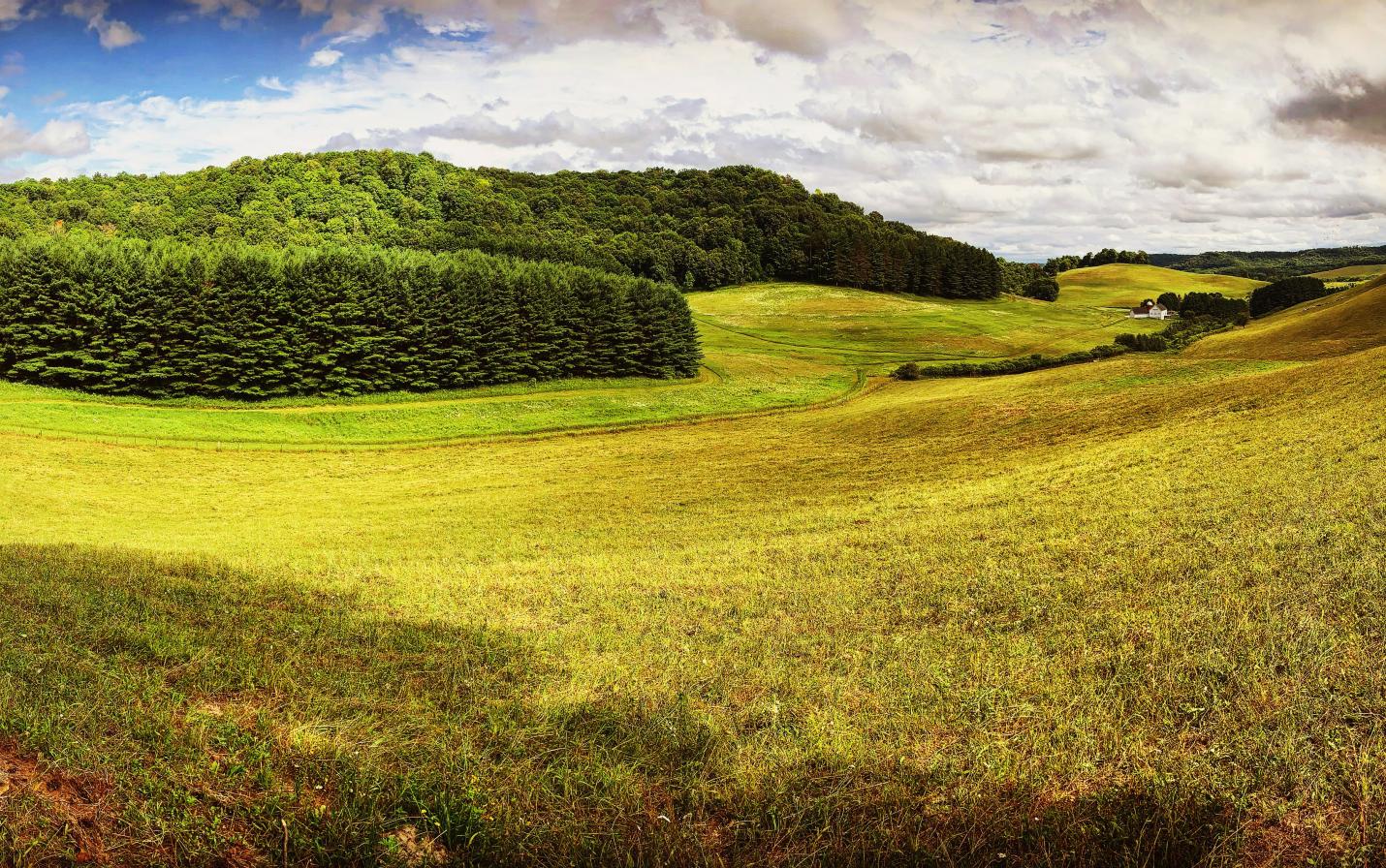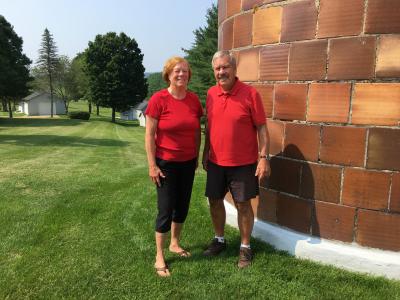
RICHLAND COUNTY, WI – The cold, clear headwaters of Little Fancy Creek babble in the rocky creek bed that crosses under the drive upon arriving at the farm of Susan and David Weigandt. Nearby are well-constructed chutes and ramps that allow for the movement of cattle through a rotational grazing system for the production of grass-fed beef. Running through the middle of the farm’s sweeping valley are the creek with several springs and sedge meadows filled with bulrushes, and wetland plants like boneset, blue vervain, and jewelweed. Every shade of green wraps around the valley.
Having dedicated much of their lives to protecting the natural resources of the property, the Weigandts have now helped to ensure its future with a permanent agreement with Mississippi Valley Conservancy. The agreement, a conservation easement, provides permanent protection from future residential development, subdivision, or mining of the property.
One of the most notable characteristics of the 180-acre farm is its 100% coverage with perennial plants. “Protection of the perennial vegetation on farmland surrounding springs, sedge meadows, streams, and creeks is vital for the protection of Wisconsin’s ground and surface water quality,” said Chris Kirkpatrick, MVC conservation specialist. Downstream from the property, Little Fancy Creek feeds Fancy Creek which feeds the Pine River into the Wisconsin River and, ultimately, the Mississippi River.

Neither Susan nor David are cattle experts, but they knew they wanted the land they leased to be grazed in a way that would enrich the soil and nurture the pasture plants without causing erosion or contaminating the water. They turned to the Richland County Land Conservation Department for help with protecting the creek from their tenant farmer’s cattle and ensuring that livestock could be managed to prevent over-grazing. Many of the improvements they made were possible through cost-sharing provided by the Wisconsin Land & Water Management Program.
Kenny Anderson, the county agency’s conservation technician, was an advisor to them throughout the process, and he liked the land and the improvements so much that he asked the Weigandts to consider him to be their land tenant, should the opportunity arise. That wish has since come true, and Anderson now grazes his 20-head herd on the Weigandts’ land with its four 12-acre paddocks with cattle ramps and stream crossings.
“The Weigandts are great stewards of the land,” said Anderson. “Every time I pull in to the farm, they have their bibs on, and they’re out there working away – removing invasives, planting trees, and caring for the place.”
The grazing practices are also providing important habitat for declining populations of grassland-nesting birds. Bobolinks, meadowlarks, dickcissel, and bluebirds all use the grassland habitat in the pastures. Recent studies have shown a 75% decrease in grassland bird populations over the past 5 decades, so ensuring these productive grazing lands are protected is also ensuring critical habitat for some of the most vulnerable birds in southwest Wisconsin. The perennial vegetation is good for the cattle, as well as the birds, but it’s also good for mitigating the effects of climate change by improving water infiltration and slowing down runoff during extreme weather events.
Although their land is six miles from the county seat, there are only rolling hills of oak woodlands, maple forests, and open pastures visible from the site of the original homestead that was on the Weigandt’s property. The original farmhouse is gone, but the remaining buildings are updated originals, including the former chicken coop where Susan and David took shelter in the early years of their land ownership when they lived in Madison and spent nearly every weekend at the farm, tackling the growing list of projects that came with owning the land. Today, they enjoy the rolling scenery from the original barn that has been lovingly converted into their home, complete with its exposed original post and beam construction and the vintage silo of glazed ceramic brick.
Soon after acquiring the land in 1978, Susan and David realized they had a lot to learn, so they began attending local workshops hosted by organizations including Wisconsin Woodland Owners Association and Mississippi Valley Conservancy. Their project list was formidable, so they chose to tackle one project per year. To date, their extensive conservation projects have included:
- Planting thousands of trees and shrubs, including dogwoods, hazelnuts, and ninebarks along 2,000 feet of Little Fancy Creek to provide wildlife habitat while holding the soil and keeping the waters cool.
- Streambank protection, including fencing, cattle ways, rip rap, and rock chutes
- Forestry management, including timber stand improvement, in accordance with their Wisconsin Managed Forest Law program management plan.
- Establishment of the rotational grazing system.
- Sharing their farm to help others learn – Farm Services Administration pasture walks, UW-Madison workshops, Women in Forestry workshops, Wisconsin Woodland Owners Association workshops, Pheasant’s Forever Workshops (see below)
Now, forty-three years later, the success of their conservation work can be seen and heard from the ridges to the valley, with the regrowth of oaks, the reappearance of woodland orchids, the clear water of the creek, and the songs of beloved birds, including Susan’s favorite, the eastern whip-poor-will. While there is much new development spreading outward from Richland Center, the Weigandts can enjoy the satisfaction of having protected clean water and wildlife habitat for today and for the future.
The Weigandts will be hosting a free “Women Caring for the Land” workshop about forestry and conservation practices at their property from 9:30 a.m.-3:00 p.m. on September 11, 2021. For details and sign-up, contact Britta at 608-647-8874 ext 126 or by email at [email protected]